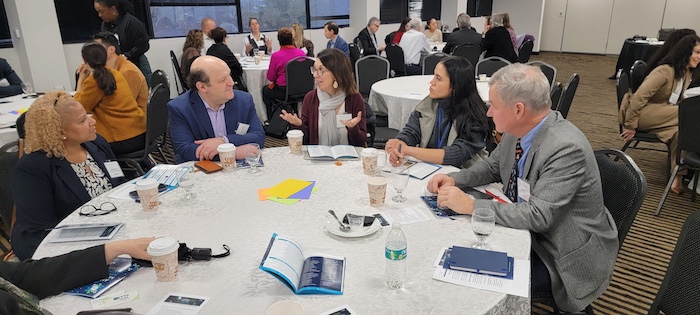Site Search
- resource provided by the Forum Network Knowledgebase.
Search Tip: Search with " " to find exact matches.
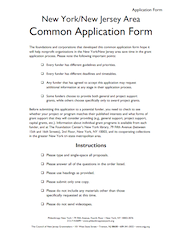
A sample conflict of interest form for independent private foundations.
Grantmakers for Effective Organizations' Collaborative Funding for Greater Impact explains the mechanics of forming and managing a co-funding partnership and offers takeaways for how this experience can apply to other communities.
While donor collaboration is not a new concept, the new economic reality has more and more families, foundations and companies looking towards collaboration as a tool to increase their impact on the issues they care about. This primer was created to help donors understand and evaluate if some form of collaboration might be right for them.
Tax Exempt Organization Search helps users find information about a tax-exempt organization’s federal tax status and filings. You can find:
- Organizations eligible to receive tax-deductible charitable contributions (Pub 78 data).
- Automatically revoked organizations
- IRS determination letters dated on or after January 1, 2014
- Form 990-series returns
- Organizations that have filed a Form 990-N (e-Postcard)
This toolkit includes a number of tools for Steering Committee Working Groups as they form, determine strategic direction, develop implementation plans, and identify measurement indicators. This toolkit includes a description of working group member responsibilities, an action planning template, and sample instructions for the development of indicators. The tools have been generalized to be applicable across contexts; however, because no two collective impact efforts are the same, these resources should be considered a starting place to be tailored to the unique circumstances of each initiative.
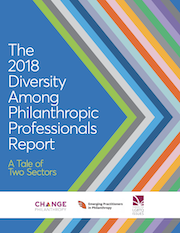
In the inaugural Diversity Among Philanthropic Professionals (DAPP) Survey, participants were asked to identify their role within their foundation, their age, gender identity, sexual orientation, race and ethnicity, and disability status. This report lays out the results of the DAPP survey in aggregate form.
Produced in partnership with CHANGE Philanthropy and Emerging Practitioners in Philanthropy (EPIP), the report and accompanying infographic explore diversity in the philanthropic workforce. Overall, the report finds a statistically significant difference between funders with a social justice focus and all other funders. Social justice funders were much more likely to have higher representation of LGBTQ people, people of color, and people with disabilities.
Foundation funding in support of global human rights initiatives totaled $2.8 billion in 2016, up from $2.4 billion in 2015, according to the report from Candid and the Human Rights Funders Network. The report from the Advancing Human Rights research hub found that 785 funders in 43 countries awarded 23,016 grants to 13,242 organizations working to address the root causes of injustice and inequality and ensure the protection and enjoyment of internationally recognized human rights. Twenty-one percent of those grant dollars were awarded in the form of general support grants.
The Council of New Jersey Grantmakers has joined with our colleagues at the Center for Nonprofits to support a new, national campaign from GuideStar, Charity Navigator and WiseGiving of the BBB. For too long, there has been a misconception that “less is more” when it comes to administrative and overhead expenses in the nonprofit community. The idea that the “best” organizations are those that spend the least amount possible – in actual dollars or as a percentage of their total budgets – has become so ingrained that it has formed the basis of public policies, rating systems and decision making for many donors. The consequences for charities and communities have been severe and far-reaching, translating into less effective organizations, starved of the strategic resources needed to do their work.
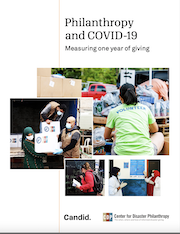
As of February 22, 2021, the coronavirus pandemic has claimed the lives of more than 2.5 million people around the world, with an additional 110 million people infected. And while data such as this serves an enormous purpose in understanding the scale and scope of a disaster, aiding experts in determining needs and directing resources, it remains far from the complete picture of the impact of COVID-19 on humanity.
Philanthropy’s response to the COVID-19 pandemic demonstrates that not only can donors be exceedingly generous in a crisis, but they can lead through trust and courage. In this new report, the Center for Disaster Philanthropy and Candid recognize this leadership, as demonstrated by increased overall giving, even if too little of it is in the form of unrestricted grants and funds directed toward Black, Indigenous, and other communities of color. There remains much to be done, especially regarding support for programs that deliver the policy and system changes necessary to redress generations of inequities.
The Community Foundation of South Jersey formally launched in 2008 after three years of extensive planning through the efforts of CNJG and a number of Council members. CFSJ is dedicated to the southernmost counties of New Jersey - Atlantic, Burlington, Camden, Cape May, Cumberland, Gloucester, Ocean, and Salem. These counties are exceptionally diverse, stretching from rural farm lands to pockets of densely populated and poor urban areas, juxtaposed against wealthy suburban communities. However, they share many of the same social problems – a challenging economy, unengaged youth, access to healthcare, as well as issues related to hunger, unemployment and housing. Realizing the need, Council members through the work of CNJG formed The Community Foundation of South Jersey. CNJG is extremely proud to have played a role in building the foundation to serve South Jersey for generations to come.
The F. M. Kirby Foundation Board of Directors announced 255 grants totaling $15,431,175 were approved in 2023 to nonprofit organizations working to increase the strength and vitality of our communities.
Of this total, over 130 grants included general operating support and over 140 grants were made to organizations that have been partners of the Foundation for over 25 years, representing the Foundation’s grantmaking strategy of forming long-term, trusting relationships with grantees. Grantmaking in 2023 included a combined $9.1 million to organizations working in New Jersey and North Carolina, the Foundation’s primary geographic areas of interest. Additional grants, totaling over $6 million, supported organizations in Connecticut, New York, and Pennsylvania, regions dear to Kirby family members, as well as national nonprofits largely based in Washington, D.C., and New York City.
ValuesAdvisor, a nonprofit online platform, helps you find the financial expertise needed to implement a mission-aligned investment strategy. Access to ValuesAdvisor is provided at no cost as a benefit of your membership in CNJG.
ValuesAdvisor offers a searchable database of values-oriented investment advisors, who have been suggested by other trusted affinity groups and philanthropy-supporting organizations. The platform offers a simple and dynamic interface that allows you to filter advisor information on data points such as minimum account size, amount of values-aligned AUM, impact themes, service offerings, asset classes, diversity, and other key information. Note: the platform does not collect user data and is committed to preserving the anonymity of the asset owners who use the platform.
To join, visit the ValuesAdvisor website and enter 'CNJG' at checkout to claim your free access.
To Get Started/Questions:
Kate Simpson, Head of Outreach, ValuesAdvisor
Email: [email protected]
If you have an advisor you’ve worked with who has helped your foundation align your investments with your mission, and believe your peers would benefit from working with, you can suggest them for the ValuesAdvisor platform in their short, “Suggest an Advisor Form.”
For more information, please watch this video or download the infographic below.
2026 CNJG Membership Renewal
Thank you for your membership investment with CNJG!
We continue using our contactless renewal process for the 2026 membership year. We no longer mail renewal notices. The “primary contact” for each member will receive the renewal notification by email in mid-October, 2025
“[CNJG has] done an amazing job of meeting people where they need to be in terms of providing additional resources and access to people in the know to help us navigate through very unchartered waters.”
-Margarethe Laurenzi, Maher Charitable Foundation
The dues investment for 2026 includes a Board-approved 3% increase. Members should base their 2026 dues on either:
1. Your 2025 giving or
2. An average of the past three years in giving (2023, 2024, 2025).
The chart of dues, based on your annual giving is below:
| Annual Giving Level | 2026 CNJG Dues |
| $ 0 to $ 100,000 | $ 795 |
| $ 100,001 to $ 250,000 | $ 955 |
| $ 250,001 to $ 500,000 | $ 1,485 |
| $ 500,001 to $ 750,000 | $ 1,900 |
| $ 750,001 to $ 1 million | $ 2,650 |
| $ 1 million to $ 2 million | $ 3,700 |
| $ 2 million to $ 3 million | $ 5,900 |
| $ 3 million to $ 5 million | $ 8,500 |
| $ 5 million to $7.5 million | $ 10,470 |
| $ 7.5 million to $10 million | $ 11,075 |
| $ 10 million to $15 million | $13,250 |
| $ 15 million to $20 million | $16,250 |
| $ 20 million to $30 million | $23,700 |
| $ 30 million to $50 million | $26,500 |
| $ 50 million to $75 million | $36,875 |
| $ 75 million and above | $43,000 |
The membership period begins January 1, 2026 and runs through December 31, 2026.
Some members choose to make all or a portion of their dues in the form of a grant. For tax purposes, all dues in excess of $795 may be reasonably reported as a grant.
Government agency dues are based on a percentage of your administrative budget. The renewal form will help you calculate your dues.
Dues for associate members (CDFI’s and philanthropic advisors) are a flat $1,680.
For additional criteria for dues calculations (ie. sun-setting foundations, those headquartered outside the state, and other special circumstances), please visit the Membership Policies section of our join page.
Renewal notices are due annually by March 31 with payments due by June 30. You can complete the renewal form today and pay any time before June 30. If you need to pay after June 30, please note the alternate payment date on the renewal form. Please contact Craig Weinrich, Director of Member Services at 609-414-7110 x802 to make payment arrangements. CNJG prefers to receive membership payments by EFT. Checks are also acceptable, and please note our address. If you decide to pay via credit card, CNJG will add a 3% fee to the membership dues amount.
Leadership Gifts
“Engagement with other funds throughout the state as we think about how to be most strategic have been really helpful to understand what others are doing and the implications of how we do our grantmaking activities.”
-Andy Fraizer, Community Foundation of South Jersey
Some members include an additional gift to help cover the costs of CNJG’s operations. Membership dues cover about 40% of our operations. These welcomed and unrestricted funds help underwrite the many programs and services that CNJG provides to our members and the philanthropic sector.
Please indicate your additional leadership gift on the renewal form when you complete it.
2026 Renewal Timeline
- Mid-October 2025 – CNJG membership renewal notices are emailed to the designated “primary” contact;
- March 31, 2026 – CNJG membership renewal commitments due (payment can be received later)
- June 30, 2026 – Dues should be paid by this date. A few members pay in the second half of the year, and CNJG appreciates knowing before then that you are renewing. Members that have not paid by this date, or indicated to CNJG that payment is forthcoming by this date, will be considered lapsed and removed as members.
- Mid-October, 2026 – Renewals for 2027 will be emailed.
2026 Member Renewal Process
- The link to our online renewal notice will be emailed to your designated “primary contact” in mid-October. In subsequent reminders, the invoices will be emailed to both the "primary contact" and the "billing contacts" at the organization. If you have not received any renewal notice, please let Craig know. You can complete the renewal notice here.
- Complete and return the renewal notice with either:
The amount of dues you are paying (based on your giving outlined above) and when CNJG can anticipate the payment.
or
Your pledge to pay at a later point in the year. Payment should be received by CNJG before June 30. Please contact Craig if an alternate payment date is needed. - Submit the renewal notice/invoice with payment or your pledge to renew by March 31.
- Update your contact information by having one of your “administrative contacts” update this information on the website. There are tutorials on our website about this process, or contact Craig with questions.
Looking Ahead to 2027
Our expectation is that for 2027, we’ll ask members to base their giving on your past three years average, or on your 2026 giving. We will also include the annual CNJG board-approved 3% increase in dues. CNJG has mapped out the dues rates for the next several years, so members can budget accordingly.
Thank you for being a part of the CNJG membership as we support and elevate New Jersey’s philanthropic community through shared learning, collaborative and trusting relationships, network building, and leadership.
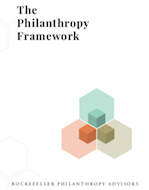
Rockefeller Philanthropy Advisors has released The Philanthropy Framework, a tool for analysis and planning to guide emerging and established philanthropies to better align resources for maximum impact. Created with input from leaders from more than 50 foundations worldwide, the tool seeks to address fundamental changes in philanthropy and the world such as generational shifts in attitudes, massive wealth creation, diversity of capital, new models for impact, and new operating environments among others.
It lays out three core elements for philanthropists to consider when determining how to maximize their impact:
- Charter, the organization’s scope, form of governance, and decision-making protocol
- Social Compact, its implicit or explicit agreement with society about the value it will create
- Operating Model, the approach to the resources, structures and systems needed to implement strategy.
Bank of America is making a $560,000 donation to the Career Services Center at New Jersey City University to aid in the effort to help students of color successfully complete the education and training necessary to enter the workforce and embark on a path to success.
The unique grant is the largest single corporate gift and most significant investment in career development in NJCU’s history, school officials said. The investment is in the form of a four-year grant that will address racial, ethnic and income inequality.
Access to good jobs and meaningful careers is key to closing the racial and ethnic wealth gap. Students of color often face daunting challenges, including financial hardship, lack of guidance in choosing courses that will help them achieve success, and lack of internship and skill-building opportunities to prepare for career readiness.
Bank of America officials said the company is working to address these issues as part of its $1.25 billion, five-year commitment to help advance racial equality and create economic opportunity by focusing on priority areas of jobs/education/skills, health, small business and housing.




